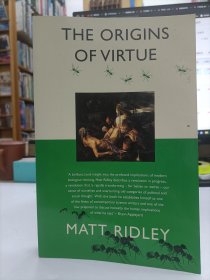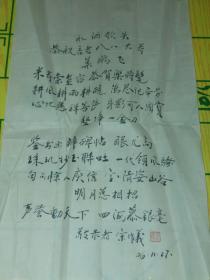
The Origin of Species(英文原版)
实物拍摄,正版现货
¥ 30 九品
仅1件
作者Charles Darwin
出版社Wordsworth Editions Ltd
出版时间1998-04
版次1
装帧平装
货号7-4
上书时间2020-07-03
- 在售商品 暂无
- 平均发货时间 11小时
- 好评率 暂无
- 店主推荐
- 最新上架
商品详情
- 品相描述:九品
图书标准信息
- 作者 Charles Darwin
- 出版社 Wordsworth Editions Ltd
- 出版时间 1998-04
- 版次 1
- ISBN 9781853267802
- 装帧 平装
- 开本 20开
- 纸张 胶版纸
- 页数 392页
- 【内容简介】
- 'A grain in the balance will determine which individual shalllive and which shall die...'. Darwin's theory of natural selectionissued a profound challenge to orthodox thought and belief: nobeing or species has been specifically created; all are locked intoa pitiless struggle for existence, with extinction looming forthose not fitted for the task. Yet 'The Origin of the Species'(1859) is also a humane and inspirational vision of ecologicalinterrelatedness, revealing the complex mutual interdependenciesbetween animal and plant life, climate and physical environment,and - by implication - within the human world. Written for thegeneral reader, in a style which combines the rigour of sciencewith the subtlety of literature, 'The Origin of the Species'remains one of the founding documents of the modern age.
- 【作者简介】
-
Charles Darwin was born in Shrewsbury, England, on February12, 1809 into a prominent middle-class family. His mother, who diedwhen Darwin was eight, was the daughter of the famous potter JosiahWedgwood. His father was a wealthy doctor, and his grandfatherErasmus Darwin had been a celebrated physician and writer whosebooks about nature, written in heroic couplets, are often read asharbingers of his grandson's views. Yet for someone whoserevolutionary writings would turn the scientific world upside down,Darwin's own youth was unmarked by the slightest trace of genius.'I believe that I was considered by all my masters and by my Fatheras a very ordinary boy, rather below the common standard ofintellect,' he later said. Darwin was an indifferent student andabandoned his medical studies at Edinburgh University. In 1831Darwin graduated with a B.A. from Christ's College, Cambridge,seemingly destined to pursue the one career his father had deemedappropriate--that of country parson.
But a quirk of fate soon intervened. John Henslow, a Cambridgebotanist, recommended Darwin for an appointment (without pay) asnaturalist aboard the H.M.S. Beagle, a scientific vesselcommissioned by the Admiralty to survey the east and west coasts ofSouth America. Among the few belongings Darwin carried with himwere two books that had greatly influenced him at Cambridge:Charles Lyell's Principles of Geology, which posited radicalchanges in the possible estimates of the earth's age, and anedition of the travel writings of the early nineteenth-centurynaturalist Alexander von Humboldt. The Beagle sailed from Plymouthon December 27, 1831, and returned to England on October 2, 1836;the around-the-world voyage was the formative experience ofDarwin's life and consolidated the young man's 'burning zeal to addeven the most humble contribution to the noble structure of NaturalScience.'
Darwin devoted the next few years to preparing his 'TransmutationNotebooks' and writing Journal of Researches into the Geology andNatural History of the Various Countries Visited by the H.M.S.Beagle, 1832-1836 (1839) in which his beliefs about evolution andnatural selection first began to take shape. In 1839 he married hisfirst cousin, Emma Wedgwood. They lived in London until 1842, whenDarwin's chronic ill health forced the couple to move to Down Housein Sussex, where he would spend virtually the rest of his lifeworking in seclusion. There he soon completed the five-volume workZoology of the Voyage of the Beagle (1840-1843) and outlined fromhis hoard of notes an early draft of what was eventually to becomeThe Origin of Species.
In 1856 Sir Charles Lyell persuaded Darwin to write out histheory of evolution by natural selection, which he had recentlybuttressed with ingenious experiments in breeding pigeons. Halfwaythrough the project, Darwin received an essay from naturalistAlfred Russel Wallace that presented an identical theory, thoughone unsupported by anything comparable to Darwin's massiveaccumulation of data. Wracked by doubts and indecision, and fearfulof the controversy his theories might unleash, Darwin neverthelesspushed forward to finish The Origin of Species. Published onNovember 24, 1859, the book forever demolished the premise that Godhad created the earth precisely at 9:00 A.M. on October 23, 4004B.C.--and that all species of living creatures had been immutablyproduced during the following six days--as seventeenth-centurychurchmen had so carefully formulated.
Although he did write one sequel and amplification of his theoryof evolution, The Descent of Man (1871), Darwin dedicated most ofhis remaining years to botanical studies. Charles Darwin died onApril 19, 1882, following a series of heart attacks. He is buriedin Westminster Abbey, a few feet away from the grave of IsaacNewton. - 【目录】
-
INTRODUCTION
AUTHOR'S INTRODUCTION
Variation under Domestication
Variation under Nature
Struggle for Existence
Natural Selection
Laws of Variation
Di~culties on Theory
Instinct
Hybridism
On the Imperfection of the Geological Record
On the Geological Succession of Organic Beings
Geographical Distribution
Geographical Distribution - continued'
Mutual Affinities of Organic Beings:
Morphology: Embryology: Rudimentary Organs
Recapitulation and Conclusion
An Historical Sketch of the Recent Progress of
Opinion on the Origin of Species (taken from the thirdedition)
Glossary (taken from the sixth edition)
相关推荐
-

The Origin of Virtue
九品深圳
¥ 100.00
-

The Origin of Species
九品上海
¥ 22.00
-

The Origin Of Species
八五品包头
¥ 22.66
-

The Origin Of Humankind
八五品商丘
¥ 98.00
-

The Origin of Species
九品北京
¥ 15.00
-

The Origin of Brands
九品武汉
¥ 82.90
-

The Origin of Species
八品孝感
¥ 70.00
-

The Origin Of Humankind
八五品北京
¥ 100.00
-

The Origin of Species
九品广州
¥ 80.00
-

THE ORIGIN OF SPECIES
八五品淮安
¥ 120.00
— 没有更多了 —























以下为对购买帮助不大的评价